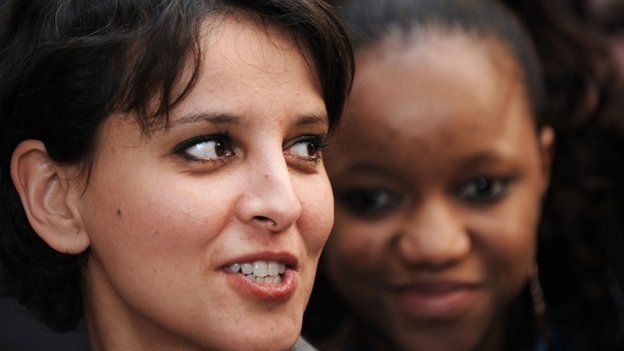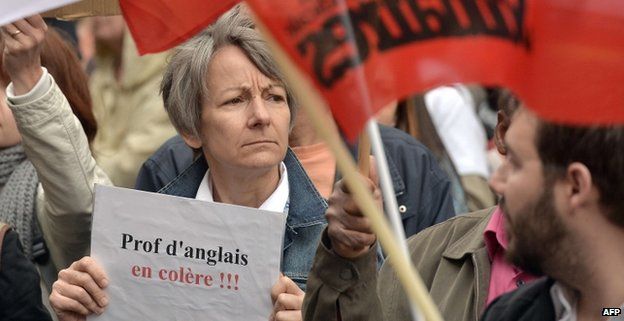
France teachers strike over government reforms
Teachers across France are going on strike against government reforms to the education system.
Trade unions representing 80% of teachers at French middle schools are leading the action against the plans.
The government wants to reduce teaching of Latin and ancient Greek, scrap an intensive language scheme and change the history curriculum.
Reports have shown increasing inequality and declining performance in French schools.
But the unions say the reforms would only serve to increase inequalities and class separation.

Education Minister Najat Vallaud-Belkacem has attracted much criticism
Teachers are expected to hold protests in Paris and dozens of towns and cities around the country on Tuesday.
The action follows weeks of strongly-worded dispute between Education Minister Najat Vallaud-Belkacem and her critics.
Ms Vallaud-Belkacem recently described opponents of the history programme as "pseudo-intellectuals" after they said it would deprive pupils of vast chunks of France's cultural heritage.

Analysis: Hugh Schofield, BBC News, Paris

European language teachers were among those protesting
School change plans come round regularly in France.
They tend to answer to the same perceived imperative: how to restore the "republican" school system to a lost golden age and stop the inexorable decline in international rankings.
This time, Socialist President Francois Hollande and Education Minister Najat Vallaud-Belkacem have targeted the "college" - the middle-school for 11- to 15-year-olds that comes between "ecole" (primary school) and "lycee".
But with awful predictability, their designs have again provoked a chorus of outrage - and not just from the teaching unions.
French teachers furious at controversial curriculum changes

The former centre-right Education Minister Luc Ferry has described the changes as "scandalous, empty-headed, noxious and partisan".
With the teaching profession voting overwhelmingly on the left, many teachers are reluctant opponents of the Socialist changes.
But they say the requirement, for example, to devise course work combining different subjects is badly thought out and imposes hours of extra labour.

Principal measures in the proposed changes:
- Phasing out Latin and Greek, to be replaced by an option in "languages and cultures of antiquity"
- Axing a reinforced modern-language programme for gifted 12-year-olds, to be replaced by a generalised second foreign language later on
- 20% of the curriculum to be "cross-disciplinary" modules organised by teachers of more than one subject




